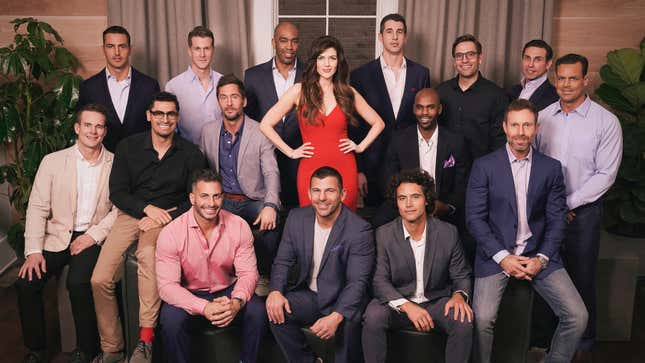

The boozy mixer is a signature of the first episode of reality TV dating shows: Singles mill about clutching flutes of bubbly while trying to stand out from the pack (and a few do, often by degree-of-intoxication). Fox’s new series Labor of Love, hosted by Sex and the City’s Kristin Davis, is no exception. The premiere starts with 15 suited men sipping at clinking cocktail glasses while vying for time with the show’s star, Kristy Katzmann, a long-ago Bachelor contestant who never found lasting love. But soon, within the first 20 minutes of the show, the cliche setup is disrupted: the cocktail party is crashed by waiters carrying trays of specimen cups instead of champagne flutes.
Now that everyone is well-lubricated, it’s time for the men to drop trou and jerk off into cups. Parked nearby is a “mobile collection unit.” If you want to get technical, it’s a masturbation bus. Katzmann stands outside, waiting for their samples, which will be analyzed for a sperm count.
Labor of Love is a reality series framed around 41-year-old Katzmann’s search for, above all, a co-parent. The show puts the men through challenges meant to prove their paternal fitness, everything from burping baby dolls to setting up a campground. The idea is that she and a winning contestant will “skip the dating and go straight to baby-making,” as Davis puts it while explaining the show’s outrageous premise in a voiceover. At this, it might seem that Fox has upped the ante of both Love Is Blind and Married at First Sight, where couples swiftly get engaged or tie the knot, to a competition culminating in baby-making. Except, the contestants begin dating Katzmann in the second episode, so there is no “skipping,” and the exact parameters of said baby-making remain unclear.
Typical reality TV hijinks become tests dividing the fathers from the boys.
It seems unlikely that the show will end with an elaborate insemination ritual, but some kind of proposal of procreation, a vow to reproduce together, is probable. The advertisement for the show features Katzmann flanked by men holding out pacifiers instead of roses or diamond rings. Clearly, Labor of Love is designed to shock with its serving up of sperm receptacles on silver platters and impotent claims of skipping “straight to baby-making,” but its most daring aspect is simply centering talk of those things purported to scare heterosexual men away in the search for love: babies, parenthood, and the biological clock. The usual romantic fantasy is interrupted with practicalities around reproduction and child-rearing.
-

-

-

-

-

-

-

-

-

-

-

-

-

-

-

-

-

-

-

-

-

-

-

-

-

-

-

-

-

-

-

-

-

-

-

-

-

-

-

-








































